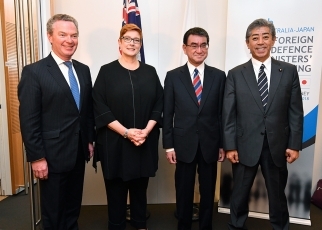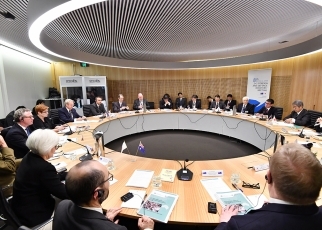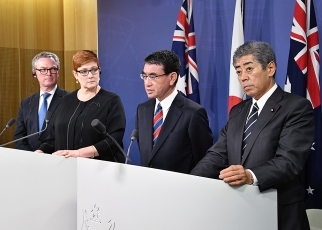Japan-Australia Relations
Eighth Japan-Australia Foreign and Defence Ministerial Consultations ("2+2")
October 10, 2018



On October 10 in Sydney, Mr. Taro Kono, Minister for Foreign Affairs of Japan, and Mr. Takeshi Iwaya, Minister of Defence of Japan, met with Senator the Hon Marise Payne, Minister for Foreign Affairs of Australia, and Hon Christopher Pyne, Minister for Defence of Australia, for the Eighth Japan-Australia Foreign and Defence Ministerial Consultations ("2+2"). An overview of the consultations is as follows (a joint statement(PDF) was issued after the consultations).
was issued after the consultations).
 was issued after the consultations).
was issued after the consultations).1 General outline
The Ministers shared the view that, amid the various issues facing the Indo-Pacific region, it is becoming ever more important to strengthen cooperation between Japan and Australia, "Special Strategic Partners" that share fundamental values and strategic interests. The Ministers confirmed their commitment to further deepening the security and defence cooperation between Japan and Australia, two countries with the will and capability to contribute proactively to the stability and prosperity of the region. The Ministers also affirmed that they would further promote cooperation with the United States and other partners.
2 Japan-Australia security and defence cooperation
(1) The Ministers shared the view that they would further strengthen and realize the cooperation between the two countries' defence authorities, including in the areas of training, capacity building and defence equipment and technology.
(2) The Ministers shared the view that the Reciprocal Access Agreement, which will reciprocally improve administrative, policy, and legal procedures to facilitate joint operations and exercises between Japan and Australia, is a vital agreement that further promotes the two countries' security and defence cooperation. They welcomed the progress in the negotiations and affirmed their commitment to conclude the negotiations as early as feasible.
(2) The Ministers shared the view that the Reciprocal Access Agreement, which will reciprocally improve administrative, policy, and legal procedures to facilitate joint operations and exercises between Japan and Australia, is a vital agreement that further promotes the two countries' security and defence cooperation. They welcomed the progress in the negotiations and affirmed their commitment to conclude the negotiations as early as feasible.
3 Indo-Pacific
(1) The Ministers confirmed that Japan and Australia would deepen cooperation in various areas, including maritime security in Southeast Asia and the Pacific Island Countries and enhancing connectivity in this region, in order to maintain and strengthen a free and open Indo-Pacific region based on the rule of law. Japan and Australia shared the view on the importance of ensuring debt sustainability, including debt transparency.
(2) The Ministers confirmed that they would further enhance Japan-Australia-U.S. cooperation in light of the importance of the role played by Japan-U.S. and Australia-U.S. alliances in the Indo-Pacific region. The Ministers shared the view that they would strengthen cooperation among Japan, Australia, the United States, and India.
(2) The Ministers confirmed that they would further enhance Japan-Australia-U.S. cooperation in light of the importance of the role played by Japan-U.S. and Australia-U.S. alliances in the Indo-Pacific region. The Ministers shared the view that they would strengthen cooperation among Japan, Australia, the United States, and India.
4 Regional affairs, maritime security, and other issues
(1) The Ministers confirmed Japan and Australia's collaboration towards North Korea's complete, verifiable, and irreversible dismantlement of all its weapons of mass destruction and ballistic missiles of all ranges. They also shared the view on the importance of fully implementing the relevant United Nations Security Council resolutions. To ensure their effectiveness, the Ministers confirmed their commitment towards continued cooperation between Japan and Australia, including addressing North Korea's ship-to-ship transfers. The Ministers of Japan welcomed Australia's deployment of patrol aircraft to address ship-to-ship transfers. The Ministers of Japan also expressed their continued expectations for Australia's understanding and cooperation towards the early resolution of the abductions issue and received the support of Australia.
(2) The Ministers discussed maritime security. They opposed any unilateral actions that escalate tensions in the South China Sea and emphasized the importance of self-restraint. They strongly urged parties to pursue the demilitarization of disputed features, and called on parties to the disputes to resolve them through peaceful means in accordance with international law. In regard to the East China Sea, the Ministers once again expressed opposition to unilateral or coercive actions that alter the status quo and increase tensions in the area and confirmed that Japan and Australia would continue to be in close communication.
(3) The Ministers discussed the situation in the Southeast Asia and Pacific Island Countries as well as cooperation in this region, and shared the view that the two countries would collaborate in this region.
(4) The Ministers confirmed that they would advance cooperation on disarmament and non-proliferation as well as the area of cyber.
(2) The Ministers discussed maritime security. They opposed any unilateral actions that escalate tensions in the South China Sea and emphasized the importance of self-restraint. They strongly urged parties to pursue the demilitarization of disputed features, and called on parties to the disputes to resolve them through peaceful means in accordance with international law. In regard to the East China Sea, the Ministers once again expressed opposition to unilateral or coercive actions that alter the status quo and increase tensions in the area and confirmed that Japan and Australia would continue to be in close communication.
(3) The Ministers discussed the situation in the Southeast Asia and Pacific Island Countries as well as cooperation in this region, and shared the view that the two countries would collaborate in this region.
(4) The Ministers confirmed that they would advance cooperation on disarmament and non-proliferation as well as the area of cyber.

